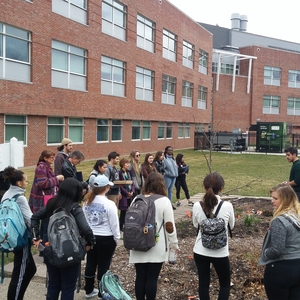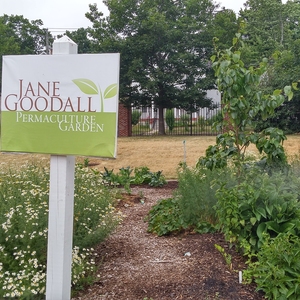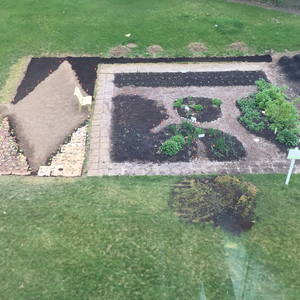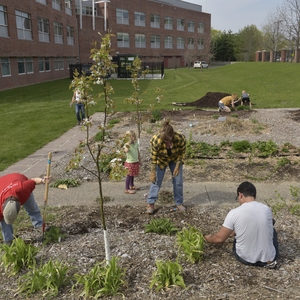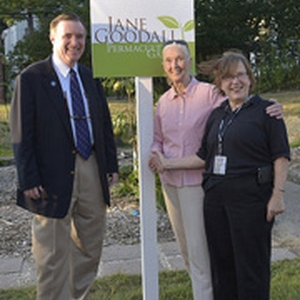Permaculture and Community at WCSU
Western Connecticut State University
Project Overview
The Jane Goodall Center for Excellence in Environmental Studies is a unique partnership between Western Connecticut State University and The Jane Goodall Institute, a private non-profit organization dedicated to wildlife research, education and conservation. By design, the Center has linked the extraordinary resources of The Jane Goodall Institute with Western Connecticut State University and its long-standing commitment to the environment and community outreach. The University's exemplary Arts and Sciences class offerings and research capabilities further complement the collaboration. The permaculture garden is the centerpiece for the JGC and as such it integrates student learning with community outreach.
Background
The seeds were planted to start a garden initiative after the Jane Goodall Center at WCSU hosted two campus visits and public talks given by Ryan Harb. While a student at the University of Massachusetts Amherst, Harb was responsible for launching a nationally recognized permaculture garden program at his university and was presented with a Champions of Change award from President Barack Obama.
In June of 2014, several members of the Jane Goodall Center at WCSU, along with Roots & Shoots club members attended an important conference at UMASS Amherst in order to learn more about sustainability and the principles of permaculture. The Revisioning Sustainability Conference was an opportunity to prepare for the launch of a permaculture garden on the WCSU midtown campus during the 2014-2015 academic year. Attendees connected with others who were initiating permaculture principles on campuses across the country.
The permaculture garden project at WCSU, sponsored by the Jane Goodall Center for Excellence in Environmental Studies was launched with the approval of our faculty and administation in 2014. Our Garden Advisory Board is made up of WCSU faculty and staff from many different disciplines and offices. In addition, representatives from local businesses and organizations were invited to participate. Mr. Ryan Harb, Jono Nieger of Regenerative Designs, and Mr. Bill Bean, of Green Planning & Coaching, all certified permaculture garden designers, acted as consultants and assisted with strategy, design and implementation plans.
Dr. Laurie Weinstein, former Chair, and now consultant for the JGC, stated, “Our mission in creating the garden at Western was to reconnect our community with the land. Many of our students, and the population in general, are naïve about where our food comes from and how it gets to our plates. We want our students and community to learn about healthy and humane eating. We want to give them skills that they can incorporate into their own lives.”
The Jane Goodall Permaculture Garden was planted in a space designated near the Science Building, a space originally intended for such use. The garden lays the groundwork for engaging many more students, faculty and the wider community. A design team was created of faculty, students and consultants in the spring of 2014 and in November of that year, a group of 25 permaculture enthusiasts made up of WCSU Roots & Shoots Club members, students, faculty, staff and community volunteers turned out to help prepare the garden area. The group composted, placed a cardboard layer and mulched approximately 1,000 sq. ft of space in three hours time under the guidance of our friends and consultants, Ryan Harb and Jono Nieger of Regenerative Designs.
Since 2014, the garden has been expanded several times and it has enjoyed the leadership of several student garden managers: Drew Shuptar-Rayvis, Ashley Kenney, Jake Locorotondo (Assistant Garden Manager), Roman Mendieta. The first three students have graduated and have used the experiences of the garden to work in sustanability, environmental studies and teaching. Roman has been managing the garden for two years now and oversaw an expansion of our lettuce beds.
Where does the food go? We have now had 3 full summers' of garden produce that is shared with our community partners: 2017-2018 Organizations that received produce from the garden Community Health Program, Danbury, CT ARC for Peace, Danbury Christian Center Food Pantry, Danbury Early Childhood Programs, Danbury Sodexo (student cafeterias and catering)
2016-2017 Organizations that received produce from the garden Our Daily Bread, Danbury Mobile Food Pantry, Ridgefield Hillside Food Pantry, Brewster IRIS, Integrated Refugee and Immigrant Services Sodexo (student cafeterias and catering)
Goals
• Add permaculture to a variety of WCSU courses across all disciplines (see below for a listing of those classes) . • Offer an opportunity for students, of all ages, to unplug and spend time with nature. • Provide food to campus cafeterias. Sodexo, the university's food service, lent strong their support with some initial funds to begin the project. Items harvested from the garden will continue to provide fresh produce and herbs at harvest time as part of the dining hall menu offerings. • Continued development of partnerships with area schools, such as Ellsworth Elementary and The Alternative High School, both within walking distance of the WCSU midtown campus, magnet school and STEM program students. • The simple experience of tending the new garden will provide inspiration to learn about sustainability practices. Something magical happens when the students are in the garden: They disconnect from their electronic devices and start reconnecting with the earth and with each other • Continued collaboration with CTNOFA (Connecticut Northeast Organic Farmers Association) on winter conferences.
The garden is used by a variety of classes as a backdrop for teaching about responsible environmental stewardship: biology classes have worked on the design and implementation of the garden over the past three years; additionally, two classes in Biology and the Anthropology/Sociology class, Roots and Shoots, have used the greenhouse adjacent to the garden, to plant “starts” for the garden. A class on Food and Culture in the fall, used the garden as a test case about how to grow healthy organic food as they learned about cross cultural community gardens.
Several classes and programs at the university require volunteer work and many students have chosen to work at the garden! Philosophy, Social Sciences, Business and Health Promotion and Exercise, are just a few of the departments that have had students use some aspect of the garden in their classes. Further, the university sponsors community service days and showcases the garden as a place where students can volunteer.
Implementation
Most of the project implementation is covered in the Background description, above.
Key points will be listed below:
* 2013 Dr. Laurie Weinstein meets Ryan Harb at an Omega Center conference in Rhinebeck, NY
* 2013-14 Ryan visits WCSU and gives presentations about permaculture
* 2014 Students, staff and faculty attend UMASS Sustainability conference at Amherst
* 2014 Ryan Harb, Bill Bean and Jono Nieger become involved in the permaculture project
* 2013-14 Weinstein and Harb convince WCSU administration to allow us to plan a permaculture garden
* Weinstein applies for and receives monies from Sodexo and help from Trader Joes and Whole Foods
* Weinstein hires Diane Hassan (private researcher) to design web page, brochures, etc and turn the JGC into a 4013c charity (to apply for more funding)
* 2015 our first harvest; Drew Shuptar-Rayvis is Garden Manager; he is of Native descent and leads a ceremoney to honor the garden; he also imports heirloom corn, beans and squash seeds to plant in traditional corn hills; Trader Joes and Whole Foods give us volunteers and food for our garden!
* produce shared with community pantries and the WCSU food service
* 2016 Ashley Kenney is Garden Manager; she leads a program on Farm for Yourself with weekly lectures during the month of March with farmers from local CSA's; Food is shared with community pantries and Sodexo; Ashley starts a program whereby seeds are first planted in the greenhouse, adjacent to the garden and then transferred to garden
* 2017 Roman Mendieta is our Garden Manager; more classes become involved with the garden and Roman takes on an active teaching and supervisory role for other volunteers
* 2018 Roman expands the garden; more produce is grown and shared with community partners
* 2018 Roman is continuing to manage the garden
Throughout this whole time period, funding has been essential. We used to receive funding from WCSU; however, given the budgetary crises affecting all institutions of public higher education, we have not received funding in over five years, consequently Dr. Weinstein has had to apply for grants and various awards. Our accolades are listed below:
2014-2016 Fundraising and Awards We obtained food from local farms that supported our permaculture initiative and we had a Farm to Table Dinner that netted 3,000 for the garden. Sodexo award 2,000 We received 500.00 from the Women's Club of Greater Danbury and New Fairfield Whole Foods, Trader Joes, Chamomille Natural Foods, Halas Farms, New England Compost, Connecticut Northeastern Organic Farmers Association, Hickory Farms, Warrups Farm, and the Danbury Food Collaborative program were all big supporters of our initial, as well as, on-going efforts
2016-2017 Awards
Community Champions grant by Constellation, an Exelon company, $500.
Environmental Champion Award by Aquarion Water, $2,500.
Women’s Club of Greater Danbury and New Fairfield, $500.00
2017-2018 Awards Anonymous donation to the JGC through the Foundation, $10,000. Staples Community grant, $3,500. Women’s Club of Greater Danbury and New Fairfield, $500.00
Timeline
**Please see the above timeline and the Background **
The "seed" for this garden began in the summer of 2013. It took 2 years of hard work to turn a dream into a reality---hard work in terms of getting the appropriate consultants, personnel, materials and funding.
Our web site also contains a project timeline:
http://www.wcsu.edu/goodall/permaculture/beginnings.asp
Financing
General Financing costs per year: approximately 4,000.00
Student Garden Manager: $2,500.00 Seed/plants, tools, hoses, seed pots, soil, fertilizers, etc. 1,000.00 Compost and/or mulch: $ 500.00
Results
Community Served: As mentioned, we donate food to local pantries and shelters and we educate the public about sustainability and climate change. We also provide an important venue at Westconn for students to learn about the value of permaculture and supporting local farmers. The educational value of teaching students and others about gardening cannot be overstated.
Total Served by Program (estimated): 5-6 classes per semester x 30 students each x 4 yearsT= >600 students; The Jane Goodall Center Climate Change series (2016 - 2018) and the Farm for Yourself series (2016 only) approximately 60 people (students and the Danbury general public) per lecture x 16 lectures T= app. 1,000; 2 Fundraisers T=200; Food pantries in Danbury area (Hillside, Our Daily Bread, Dorothy Day, IRIS, CHP, ARC, Christian Center Food, etc), T=> 1000 people over the course of 4 summers of food; Sodexo food service for students and faculty in WCSU cafeteria T=> 1000? CT NOFA winter conference at WestConn with JGC as the major sponsor (600-1000 attendees from all over CT per conference) T=3,000 for the past three years
% of disadvantaged served: A lot of our food goes directly to the food pantries and to refugee families. We are expanding the garden and will be networking with more soup kitchens and pantries over this coming summer, through our affiliation with the Danbury Food Collaboration
Gender and Age served: Men, women and children of all age groups and all ethnicities and socioeconomic statuses
Lessons Learned
This project was a lot of work, and I mean a lot of work. A campus garden sounds simple enough, but it requires a vision, a plan of action, and the funding and personnel to make it happen. You need experts to help you "concretize" the vision and you need to sell the project to the powers that be. Each one of these steps requires patience and vigilance. We were lucky to have a great team of experts help us with all the steps, from planning and design to production. The hardest sell was often the administration of the university-we had to prove to them that we were not going to plant and then ignore the garden and end up with a pile of weeds. We also had to create an infrastructure that included signage, brochures, a 501 3c charity, web designs and a FB page. We had to continue to get community involvement and spread the word about the great things we were doing on campus. We now have community people coming to us, including everyone from Girl Scouts to the public libraries and public teachers. We are a centerpiece of sustainability in the Danbury area.

